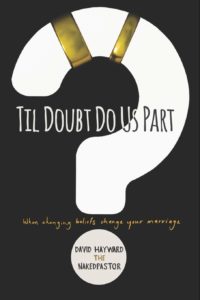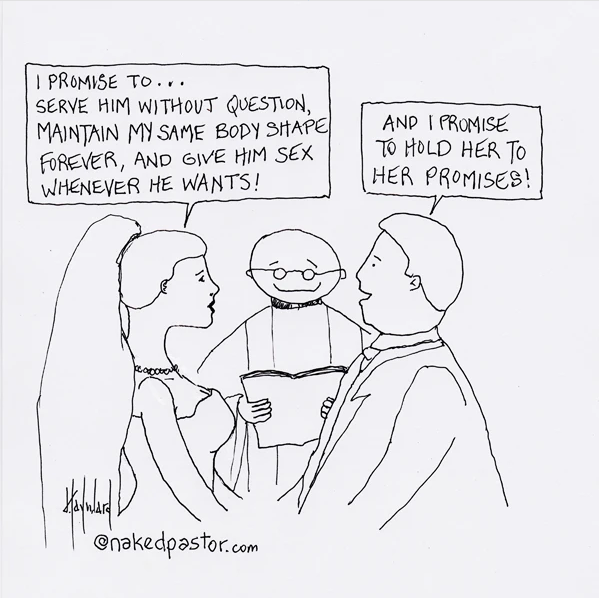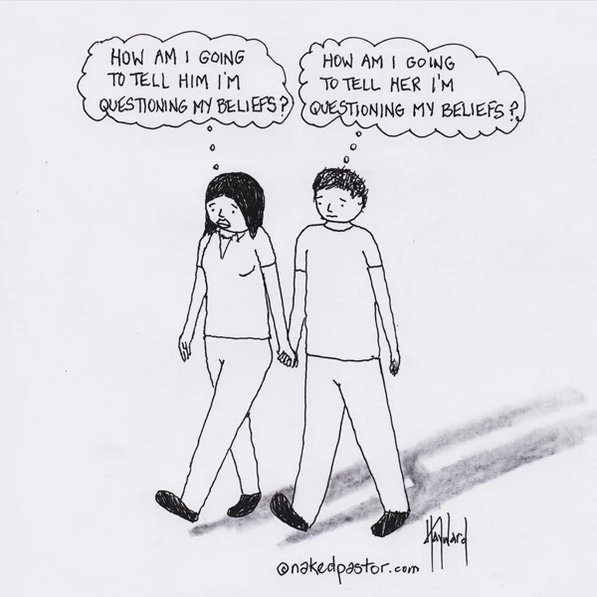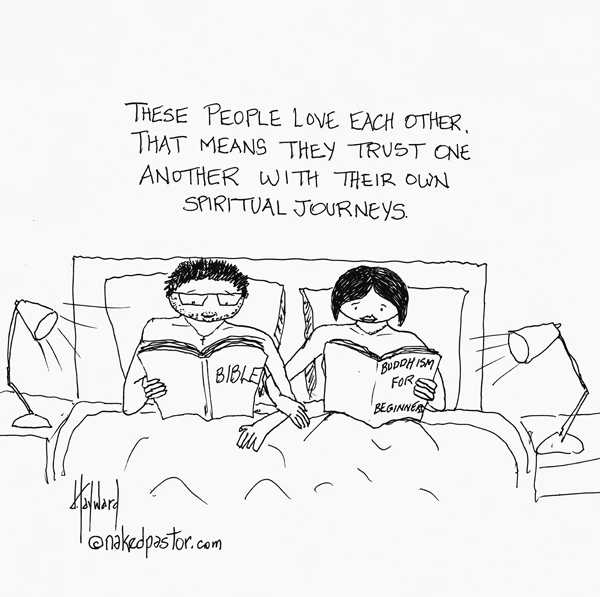Doubt, Marriage, and the NakedPastor

In his latest book, Til Doubt Do Us Part: When Changing Beliefs Change Your Marriage, former pastor and cartoonist David Hayward (aka NakedPastor) explores the complex issues that arise when doubt forms around the religious beliefs held by a married couple. I spoke to Hayward about his findings, highlighting in this short but informative guide featuring blog posts and cartoons.
Becky Garrison: Why did you choose the name NakedPastor?
David Hayward: NakedPastor means a pastor who lets people see behind the façade. A pastor being real, honest, raw, vulnerable, transparent, and unadorned.
Garrison: What prompted you to write Til Doubt Do Us Part?
Hayward: I have been writing a bunch of blog posts and drawing cartoons related to people who change their beliefs while married and how traumatic that can be. I saw a lot of marriages blowing up when one or both people started what I call deconstructing and changing their beliefs. When doubts form about religious beliefs, many find it difficult to stay together because their spouse is no longer the person they married. Individuating and becoming independent while still in a relationship is another struggle that many people have difficulty with, but it can be done.
My wife Lisa and I we ended up staying together after we became disentangled and unmatched. This resulted in us becoming more individuated and independent, and therefore we were able to form a more healthy, interdependent relationship.
Garrison: Define what you mean by deconstruction.
Hayward: Deconstruction was a concept first developed by French philosopher Jacques Derrida. I was studying Derrida at the time my belief system started to erode, and I co-opted the term because it sounded like a good way to describe the process I was going through. It’s not the slight changing of beliefs but basically the demolition of one’s belief system.
Garrison: You warn readers undergoing a deconstruction they may experience depression, confusion, and strain. Can you talk a bit more about that?
Hayward: That’s what I experienced, as well as the other people I’ve helped go through the process. I’ve seen a lot of people who undergo a radical change of belief or the loss of their faith go through a kind of grieving process where they let go of their former religious life or spiritual life, as well as letting go of a pretty fundamental way of thinking.
Garrison: What are some signs that a marriage can survive a deconstruction?
Hayward: Based on my own experience and observations of other couples, there needs to be a foundation of mutual respect. I trust Lisa with her life and her own journey, and she trusts me with mine. She can experiment and explore and grow in her own way and I respect and trust her to be able to do that. And she has that same mutual respect for me. Conversely, I learned from marriage therapist John Gottman that if there’s any sign of contempt for the other person, the marriage won’t make it.
Garrison: Can you elaborate on what you mean when you write, “we didn’t marry the expression but the one expressing.”
Hayward: When I fell in love with my wife, I fell in love not only with her beauty, but with her fierce independence, her strong opinions, her wisdom, her intelligence, and her enthusiasm for adventure. We met at a Pentecostal Bible college, and our expressions at that time were as young Pentecostals. Now our expressions are different. Our belief systems are nothing near the same as they were when we got married, as we’ve deconstructed and gone through a radical transformation. If one needs to label me, I’ll go with agnostic though I prefer fluid to include all.
Our beliefs, the way we think, the way we act, the things we do, and the way we talk are all expressions of our deeper personality. Hence, the essential Lisa I fell in love with is still there, as is the essential David for her.
To connect with David Hayward and learn more about his work, log on to NakedPastor or explore his online community The Lasting Supper.



